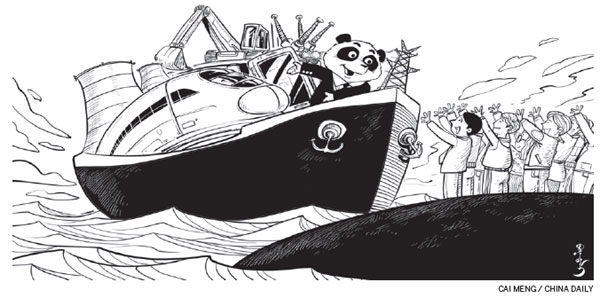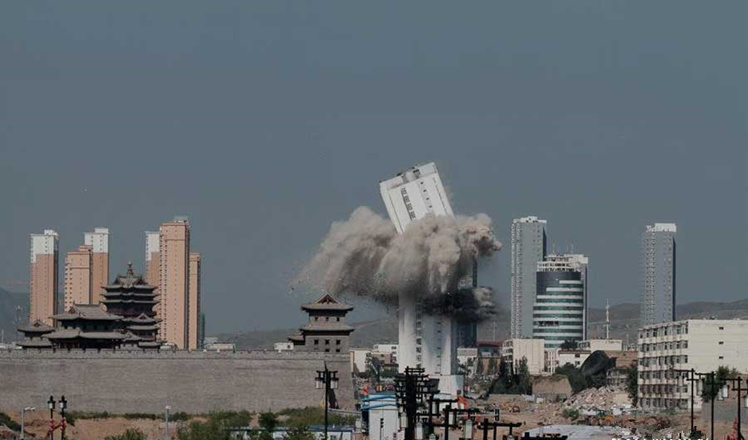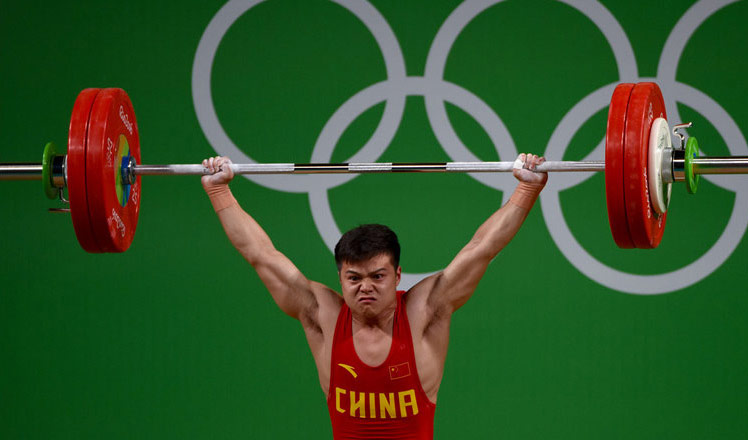Firms going global have their job cut out
Updated: 2016-08-10 08:23
By HUANG ZHILONG(China Daily)
|
||||||||
 |
With China's economy entering the "new normal", which requires reducing excess industrial capacity and deleveraging, an increasing number of Chinese enterprises are shifting their focus from domestic to overseas investments in a fresh bid to "go global".
Developed economies like the United States, Germany and Japan, too, have been encouraging their enterprises to expand in overseas markets. After the bursting of the real estate bubble in the 1990s, Japan sought to revive its economy by urging domestic enterprises to enter foreign markets. As a result, by 2015 the country's net overseas assets increased to as high as 340 trillion yen ($3.4 trillion), nearly three-fourths of its GDP.
Now Chinese enterprises are showing an even stronger urge to "go global" in the face of a widespread glut of commodities, waning investment returns, and the fluctuating yuan. Besides, the 2008 global financial crisis has dealt a heavy blow to most economies, prompting them to attract foreign investments to revitalize their manufacturing and economic growth.
Chinese enterprises have made good progress in expanding overseas. According to the Ministry of Commerce, they made direct non-financial investment of more than $88.8 billion in about 155 countries and regions during the first half of this year, an increase of 58 percent year-on-year. In particular, over $12 billion have gone into equipment manufacturing, more than 5 times the level in the first half of 2015.
Transnational mergers and acquisitions, a popular choice for Chinese investors, reportedly saw transactions of at least $111.6 billion by the end of June, higher than the total for the whole of last year.
But expansion on this scale also comes with risks and challenges, ranging from trade protectionism and lack of transnational talents to tackle volatile geo-political and economic situations in parts of Europe and Asia.
On the one hand, local governments speak highly of Chinese investors for job creation and the financial support they bring along. On the other hand, some populist political groups portray Chinese enterprises as a major threat to their national security, environmental protection, and local cultures, setting unnecessary barriers to their entry.
Following the United Kingdom's exit from the European Union, many countries face latent flight of capital and currency devaluation. The rising number of terrorist attacks and the ongoing refugee crisis in Europe, as well as tension on the Korean Peninsula also pose big challenges to the regional order.
These disadvantages have added more uncertainties to Chinese enterprises' overseas operations, for which the government is still playing a coordinating role. China has reached a series of agreements on capacity cooperation with 15 countries, and is encouraging financial institutions and its embassies to facilitate the expansion of Chinese companies abroad.
To survive and prosper overseas, Chinese enterprises should have a clear understanding of the local market environment, including relevant laws, cultural traditions and employment rules. They also need to make the best use of local labor resources, by not only creating jobs but also streamlining the management. Recruiting managers locally would be a worthwhile effort in this regard.
If more Chinese investors gain entry to overseas markets, they must not forget their social responsibilities of participating in local charity events, improving people's livelihoods and minimizing the harm caused to the environment.
The author is a senior researcher at Suning Institute of Finance affiliated to Suning Appliance Co Ltd.
- New lab will explore South China Sea resources
- 40 telecom fraud suspects returned to China
- Cheery promotional video introduces G20 city Hangzhou to Europe
- Researchers claim intelligence services targeted Chinese airline
- Tunnel-bus production center faces delays
- Chinese Valentine's Day Special: Love conquers everything
- Nepal's newly elected PM takes oath
- Texas gun law worries incoming students
- China vows to deepen economic, trade cooperation with ASEAN
- Fire guts Emirates jet after hard landing; 1 firefighter dies
- Egypt's Nobel-laureate scientist dies of illness in US
- THAAD muscle flexing unmasks anxiety over declining hegemony

 Top swimmer Sun Yang makes sweet revenge
Top swimmer Sun Yang makes sweet revenge
 Lin Yue and Chen Aisen win Olympic gold medal
Lin Yue and Chen Aisen win Olympic gold medal
 Artist creates mini-mes for loving couples at Qixi festival
Artist creates mini-mes for loving couples at Qixi festival
 Skyscraper demolished outside ancient city
Skyscraper demolished outside ancient city
 Chinese Valentine: Love conquers everything
Chinese Valentine: Love conquers everything
 Ace swimmers make record-breaking splash in Rio
Ace swimmers make record-breaking splash in Rio
 Chinese weightlifter Long smashes world record
Chinese weightlifter Long smashes world record
 China wins first diving gold of Rio Games
China wins first diving gold of Rio Games
Most Viewed
Editor's Picks

|

|

|

|

|

|
Today's Top News
Phelps puts spotlight on cupping
US launches airstrikes against IS targets in Libya's Sirte
Ministry slams US-Korean THAAD deployment
Two police officers shot at protest in Dallas
Abe's blame game reveals his policies failing to get results
Ending wildlife trafficking must be policy priority in Asia
Effects of supply-side reform take time to be seen
Chinese State Councilor Yang Jiechi to meet Kerry
US Weekly

|

|









